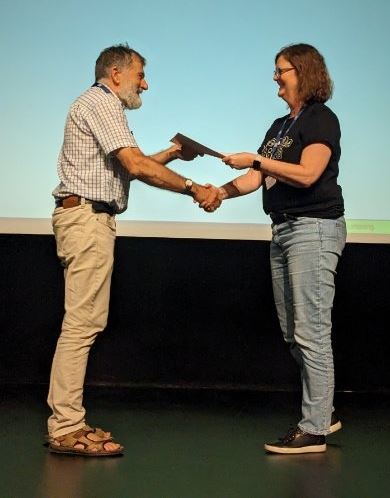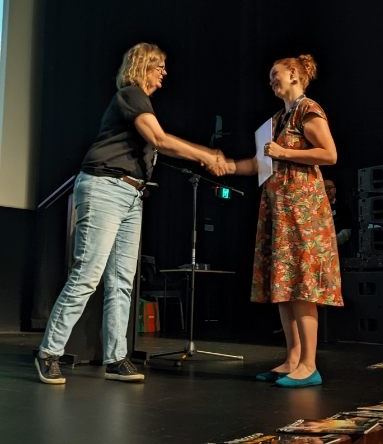A Society Service Award is awarded to a member in recognition of sustained and significant service to the Statistical Society of Australia (SSA). Four members of the Society were awarded this prestigious award in 2023:
Brenton Clarke
The Statistical Society of Australia (SSA) is proud to acknowledge and celebrate the contributions of Brenton Clarke, Adjunct Senior Lecturer, School of Mathematics, Statistics, Chemistry and Physics, College of Science, Technology, Engineering and Mathematics, Murdoch University by awarding him the Society’s Service Award.
 Since commencing his academic career at Murdoch University in 1984, Brenton has been a cornerstone of the statistical landscape in WA. Over the past 35+ years, he has dedicated himself to the advancement of the field, both academically and within the SSA.
Since commencing his academic career at Murdoch University in 1984, Brenton has been a cornerstone of the statistical landscape in WA. Over the past 35+ years, he has dedicated himself to the advancement of the field, both academically and within the SSA.
Brenton's involvement with the local branch committee of the SSA has been nothing short of remarkable. His tenure includes taking on the roles of Vice President in 2004, 2005, and 2021, and President in 2006, 2007, 2019, and 2020. Beyond these official capacities, Brenton has been a steadfast member of the Branch Council, contributing to its growth and success.
A key achievement in Brenton's illustrious career was the establishment of the Frank Hansford-Miller Fund. As the chair of the Frank Hansford-Miller Fellowship committee since its inception in 2012, Brenton has played a pivotal role in fostering connections between British and Western Australian statisticians.
His leadership skills stood out as the Chair of the program committee for the 2010 Australian Statistical Conference in Fremantle. Under his guidance, the conference catered to a diverse range of statisticians, making it one of the most successful events organised by the Society.
Brenton's influence extends beyond formal roles. His consistent attendance at monthly branch meetings for nearly four decades, his engaging talks, and his participation in discussions have been invaluable. Notably, his encouragement of students at Murdoch University to engage with the statistical community, including urging them to join the SSA, attend events and apply for awards and scholarships, particularly the WA branch honours scholarship, has been legendary.
A passionate supporter of the SSA and its mission, Brenton's contributions have been fundamental to the growth and success of the statistics community in Western Australia.
The SSA extends its heartfelt thanks to Brenton for his enduring commitment and congratulates him on this well-deserved recognition.
Stephen Horn
Stephen served the SSA as Treasurer from 2001 until 2022. He guided the Society through difficult times, including the onset of the COVID-19 pandemic. His stewardship of the Society’s finances left the Society with a healthy buffer of funds. During his tenure, Stephen provided Society Presidents with calm and measured advice on the use of Society finances.  Thanks to his efforts over the past two decades, the Society is now in a position where it has a surplus to be deployed for the benefit of SSA members.
Thanks to his efforts over the past two decades, the Society is now in a position where it has a surplus to be deployed for the benefit of SSA members.
As a statistician and member of the SSA, Stephen has always been a strong proponent of the Society’s Sections. From 2011 to 2016 he was Chair or Co-chair of the Survey and Management Section, and from 2017 to the present he has been Chair of the Official Statistics Section. In this capacity, he organised several events with the Canberra Branch, and contributed to bringing the SSA and the Australian Bureau of Statistics (ABS) closer together.
The Society is delighted to be able to recognise Stephen with this award.
Karen Lamb
A/Prof Lamb has served the SSA since 2018, when she took up the position of Co-Chair of the Society’s Biostatistics & Bioinformatics Section, modernising that Section of the Society, forming a strong, active committee. During this time, she also served on the Local Organising Committee of the Society’s Australian Statistical Conference in 2018, held jointly with the International Society for Clinical Biostatistics, in Melbourne.
In 2020, Karen established the Society’s Mentoring Program. The initial program was a pilot run through the Biostatistics & Bioinformatics Section. Following its popularity, in 2021, Karen launched the full Mentoring Program for SSA which is still running with great success.
In 2022, Karen was appointed co-Chair of the Scientific Program Committee (SPC) for the 2023 Australian Statistical Conference.
 Karen was awarded the inaugural SSA/CSIRO Betty Allan Travel Award to visit Professor Sir David Spiegelhalter, Winton Professor for the Public Understanding of Risk at the University of Cambridge, UK. This award is in recognition of her dedication to supporting the development of communication skills in statisticians.
Karen was awarded the inaugural SSA/CSIRO Betty Allan Travel Award to visit Professor Sir David Spiegelhalter, Winton Professor for the Public Understanding of Risk at the University of Cambridge, UK. This award is in recognition of her dedication to supporting the development of communication skills in statisticians.
A/Prof Lamb also represents the Society on the Significance Magazine Editorial Board. In this role she has not only ensured that that the Society’s interests are well-represented, but she also looks after a fair representation of women in the authorship of the magazine, pledging to seek out greater diversity in their authors.
The SSA warmly thanks Karen for her consistent dedication and celebrates this much-deserved recognition with her.
Damjan Vukcevic
The SSA awards A/Prof Vukcevic with the Society’s Service Award in recognition of his implementation of innovative changes and initiatives designed to enhance the engagement, diversity, and strategic direction of the Society.
Damjan played a key role in modernising the SSA brand, chairing the committee that commissioned the design of the Society's logo and visual identity with which we are familiar today. He also contributed substantially to the subsequent overhaul of the website, including the adoption of a new, integrated membership database and event management system.
During his tenure as Vic Branch President, Damjan ’s initiatives contributed to membership growth within the branch of about 25%. Event attendance nearly doubled.
 Damjan has been instrumental in organising branch presentations and seminars, often collaborating with like-minded partner organisations. He has been a champion for diversity, ensuring a gender-balanced selection of speakers and including frequent contributions from non-statisticians.
Damjan has been instrumental in organising branch presentations and seminars, often collaborating with like-minded partner organisations. He has been a champion for diversity, ensuring a gender-balanced selection of speakers and including frequent contributions from non-statisticians.
During the COVID-19 pandemic, Damjan introduced new events such as trivia, comedy shows and escape rooms, to provideways for members to interact in the absence of in-person events. Even before the pandemic, he was pivotal in hosting the SSA’s first hybrid online and in-person event, the 2019 Belz Lecture, which significantly increased engagement, especially among non-metropolitan members.
Damjan's tenure on the Council has been marked by his ability to guide new members with grace and a keen eye for administrative processes. His leadership facilitated a shift from traditional formats to more inclusive and engaging approaches.
Following his tenure as President, Damjan now continues to serve the Society as SSA Treasurer. He is also a representative on the Editorial Board of Significance magazine.
The SSA expresses its sincere gratitude to Damjan for his dedication and offers congratulations on this well-earned award.
Images provided by Jodi Phillips
